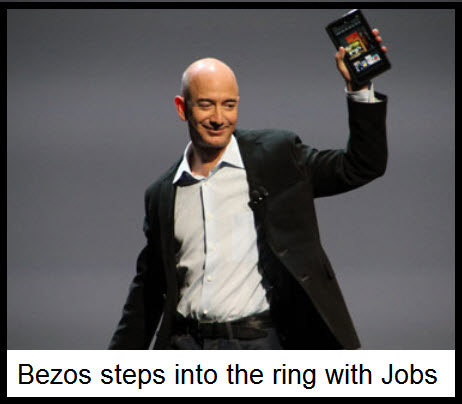With only a handful of players savvy enough to compete in the major leagues of tablet computing, competition has nonetheless erupted that is likely to hearten consumers, especially those who have tired of paying exorbitant prices for gadgets bearing the Apple logo. Yesterday, it was Amazon that stepped into the ring — with Kindle Fire, a $199 tablet that will sell for less than half of the cheapest Apple model. The 7-inch display is only half the size of Apple’s, but as Hewlett Packard’s close-out sale for a similar device proved, buyers are willing and eager to forsake Apple products if the price is right. To be sure, Amazon has targeted the lower end of the market with a tablet that cannot do all of the tricks that iPad is capable of. It lacks an embedded camera and microphone, for starters, and there is no 3G cellular connection, only Wi-Fi. Give Amazon a little time, however – perhaps eight to twelve months — and a fully-featured product will be able to go head-to-head with Apple’s best, but with the kicker of Amazon “content” to make it more than merely competitive.
Amazon’s announcement, presented by CEO Jeff Bezos with Steve Jobs-like flair, comes on the heels of an announcement that Dish, through its recently acquired Blockbuster unit, will offer streaming movies and TV shows to compete with Netflix. Recall that Netflix shot itself in the foot last month with a horrific new pricing scheme that elicited a firestorm of protests from subscribers and enough cancellations to cause NFLX shares to collapse. Since July, they’ve fallen from $305 to a recent low of $125, or nearly 60 percent. Netflix founder Reed Hastings, who even now probably still doesn’t get it, responded with some pro forma blather about how he is sure Netflix is on the right track, and that investors, if not customers, will someday appreciate the big price hikes effected by separating the firm’s mail-delivered movies from its streamed titles.
Streaming Everything
With Dish in the game, and Amazon building its own inventory of streaming everything, including movies, the day may yet arrive when we no longer have to pay $70 for bare-bones cable TV that, as far as we can tell, is mostly infomercials, rock-bottom-reality shows and movies that have been sliced, diced and chopped into 7-minute segments to accommodate advertisers. The savage competition in electronic geegaws and web-content delivery may provide the additional benefit of shutting down the carnival midway of IPOs yet to play out, including Groupon’s and Facebook’s. We mentioned here yesterday that investment capital is likely to become scarce when the Feather Merchants’ game of high-frequency trading and algorithmic point-shaving collapses, as it must. It will be better for us all if that happens before hundreds of billions of dollars are wasted on companies that leech off wealth rather than create it.
***
If you want to be on top of our detailed forecasts and trading recommendations, and to have access to a chat room that draws top traders from around the world at all hours, click here for a free trial subscription to Rick’s Picks — or here to receive our commentary free each day.)


Rich, you write:
“Sell on Rosh Hashanah and Buy on Yom Kippur”
I have never heard that one before.
Why should that be so?
The number of Americans observing both holidays is very small, maybe 2-3% of the population.
“Sell in May and go away” at least makes sense because of our summer centric vacation patterns, with so many of us being away for substantial periods in the summer.
Just wondering.
Or were you kidding?